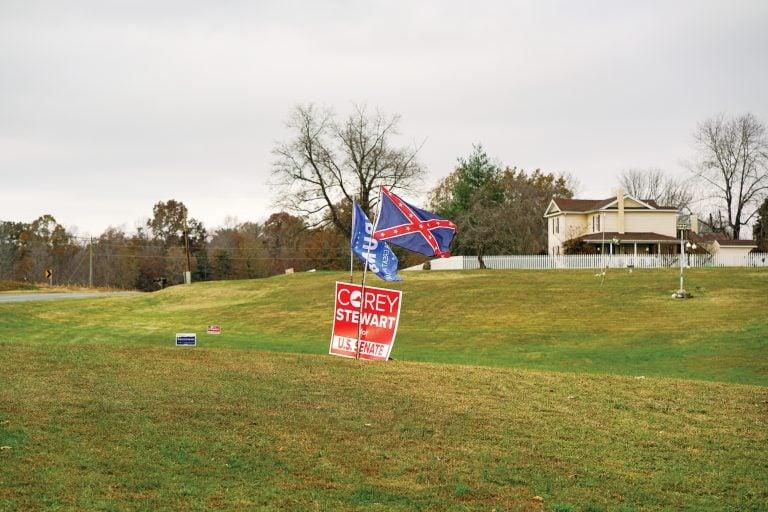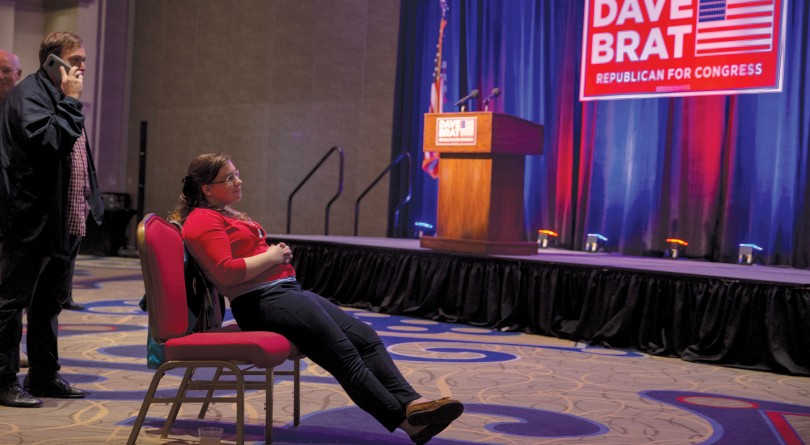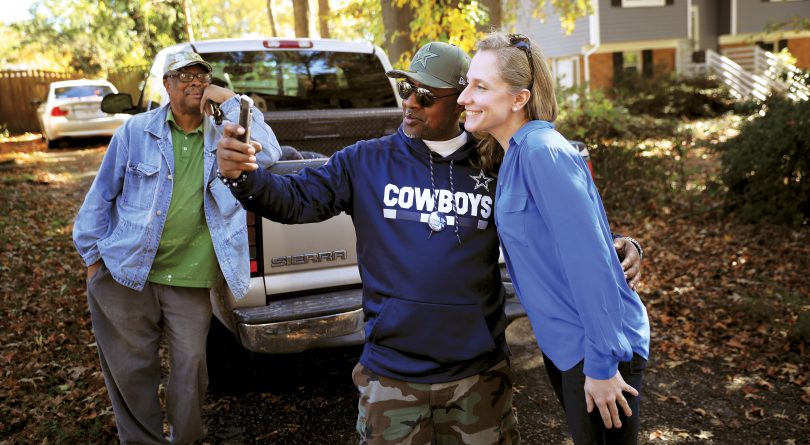One side of this road is Republican, the other Democrat. Now it’s a battle line.
Allen Abel finds a place where America’s toxic politics have torn apart towns, friends and families. Is there any going back?

Jay Miller pairs a confederate flag with a Trump flag in his front lawn between Somerset and Madison, Va. on Sunday, Nov. 19, 2018. (Photograph by Maura Friedman)
Share
Down where the Blue Ridge Mountains rise and the Volvos fade to Fords, there is a borderline that twists across the American landscape, dividing conservatives from liberals, Republicans from Democrats, ivory towers from factory towns, moneyed enclaves from boarded-up storefronts, avocados from cornbread, post-docs from post-hole diggers, and mothers from their own baby girls. The boundary is not marked on any map or app, and it is much, much older than today, yet it is razor-wired with mutual suspicion, strutting patriotism, divergent philosophies, festering prejudice, and immemorial passions. Few citizens of either side dare to cross it; some predict a shooting war across its berms.
Coming out of Washington, D.C. and heading south into the Commonwealth of Virginia, the dividing line follows a four, then two-lane highway numbered US Route 15 before branching into unnumbered byways that lead toward every state in the Union. Here, it takes more than an hour of bottleneck driving from the solid-blue bedroom subdivisions before the blacktop empties and the sky expands and you pass the first gun and ammunition shop. It is another fifteen minutes before the first field of grazing cattle, and a little while longer before the first billboard that warns IF YOU KNEEL ON OUR FLAG, WE WON’T WATCH YOUR GAME.
Suddenly, you are in a different realm from the capital of legislation, luxury, and lies. In a village called Fork Union on the James River, there is a military academy within a crenellated fortress, and a deer’s head mounted on a café wall, and butter beans on the menu. Near the hamlet of Cuckoo—named for a clock in a pre-Revolutionary tavern, so long-settled by Europeans is this region—the cashier at the filling station smiles and bids a traveller to “Have a blessed day.” You don’t hear that very often in D.C.
RELATED: Mike Pence, the next president
WE DID IT, brags a poster in a cornfield on one side of the trench, down in Nottaway County. LOCK HER UP, it laughs
IGLESIA PENTACOSTAL is the signboard at a church on the opposite shore, up near Culpeper. ALL WELCOME, it declares.
A warm autumnal morning beckons a wanderer to Orange County, Va., where, just west of the county seat of the same name, there is a classic general store called The Somerset along a stretch of what is signposted as the Constitution Route. This is the blacktop that links the estates of Thomas Jefferson and James Monroe and Patrick Henry and others of the Enlightened, slave-owning gentry who invented the system of government that ushered in 230 years of stable constitutional continuity, endured a civil war, and, eventually, gave us Donald J. Trump.

Next door is Montpelier, the columned castle of founding father, federalist philosopher and 4th President James Madison. Just beyond is the town of Orange with its still-extant Confederate battle monument that urges a reader to CHERISH THEIR MEMORY and IMITATE THEIR EXAMPLE. Jefferson’s University of Virginia in pretty Charlottesville, where it all turned so deadly in August, 2017, is half an hour away, sealed within its own envelope of effete academic certainty.
The Somerset Store tries to satisfy both the requisites of the local sodbusters and the affinities of the arrivistes who come to Montpelier for the Hunt Races every November. Thus the owners have hung Monet and Modigliani posters right above the racks of snuff.
A woman named Renée McElheney operates the shop. The dividing line between red and blue America, she says, runs not only through her state, not only through her county, not only through her Congressional district, and not only past her window—it splits her kitchen, and her family, in two.
“This area is RED,” she says, and red has been the colloquial colour of the Republican Party since the 1980s, for no logical reason.
“Is it red or is it ANGRY red?” she is asked.
RELATED: The U.S. midterm elections will be a battle of billionaires
“Around here,” McElheney retorts, “my friends who are angry are the Democrats.”
Renée McElheney says that she didn’t fall for Barack Obama and his suave proclamations of Hope, but, she states, “he was our pilot, and if the plane went down, we all would die together.” She preferred Dr. Ben Carson for the presidency in 2016, but voted for Trump in the end. And so here we are, chatting, when a local workman named named Jim Miller and his son Jay come in to buy some water.
“Some guy from the Republican National Committee knocked on my front door and asked me to take down my Confederate flag until after the election,” Jay Miller says. (Note that the minion didn’t say “Take it down forever.”)
“What did you tell him?”
“I said hell no.”
“If somebody heckles me in a restaurant, I ain’t leaving,” Jay Miller vows. (We are just a few miles from tony Lexington, Va., where Trump’s willing mouthpiece, Sarah Huckabee Sanders, was asked to vacate a cookery a few months ago.) “I’m gonna pick up a chair and probably end up in jail.”
“You know that Confederate statue in Orange?” asks Jim Miller. “If they come for that, I’m gonna back up my truck and take it home and put it in my front yard. When’s the last time that statue threw something at somebody?”
It was an effigy of General Robert E. Lee, of course, that provoked all that rage in Charlottesville, where a woman died when some gallant patriot decided to drive his car into the crowd. But people should be talking, Jay Miller says, about “the good Republicans, the ones who are proud of their heritage, not the goofballs running over people.”
“I’ve never seen hatred like this, such animosity” Jim Miller says. “And I ain’t looking forward to it getting worse. If it keeps going on much longer, we could be looking at a civil war.”

RELATED: Does Donald Trump incite violence? Let’s count the ways.
“We’re two years in,” says Renée McElheney, “and I’m still seeing so much anti-Trump stuff and I’m like, ‘C’mon, y’all.’”
One of the y’alls is Renée’s own daughter Taylor Perkins, 23 and a student at Old Dominion University in Norfolk. Every morning, Renée says, Taylor proudly forwards to her mom the latest anti-Trump online fusillade.
“And every morning,” the mother reports, “I disprove it. And then she starts preaching about pro-choice and how horrible all Republicans are, and I have to remind her that I am one, and we’re not all monsters. She’s as Democrat as you can get, and she’s down there at Old Dominion drowning in student loans and all excited about how Bernie, Bernie, Bernie’s gonna wipe out all her debt and legalize marijuana all across the country.”
“Would your daughter heckle a Trump cabinet member in a restaurant?”
“Absolutely.”
“Does she hate to the point of shooting somebody?”
“No, ‘cause she’s against ALL guns.”
“I never thought it would cut through my own family,” says Renée McElheney. “We’ve come to a place now where we don’t talk about it anymore. We talk about school, we talk about relationships, we talk about family. At Thanksgiving, we won’t mention it at all.”
Not long ago, the shopkeeper says, she had Jim and Jay Miller come over to do some work on her house.
“Do you know what my daughter said that day? She said, ‘Mom, I’m not coming home until those racists are gone.’”
***
You may have heard that there is going to be an election across the United States on Tuesday, with all 435 seats in the House of Representatives in play all over again. For this you can thank James Madison, who proposed two-year terms for the lower chamber because, as he wrote in Federalist Paper 52, the House would wield the ultimate weapons of budgeting and impeachment. “It is a received and well-founded maxim,” quoth the squire of Montpelier, “that the greater the power is, the shorter ought to be its duration; and, conversely, the smaller the power, the more safely may its duration be protracted.” So Donald Trump gets four years and the haughty senators six while the people’s reps are unseated after two.
Last Wednesday morning, it was easy to pinpoint the dividing line between red and blue America—it was South Main St. in the little town of Blackstone, Va. down almost to the North Carolina border. In a pastel gourmet café on one side of the street was the Democratic candidate for the 7th District, and on the other side of the street, in a black-walled brew pub, was the Republican. The seat, which has been held by Republicans for the past half-century, is rated a toss-up this time. Close to 10 million dollars has been spent on broadcast advertising across this fractional slice of the Commonwealth, nearly all of it spiteful, personal, venal, and untrue. As a whole, the Commonwealth of Virginia is so perfectly, precisely, politically divided that the swing vote in the state House of Delegates was decided by a draw of lots last December after one contest ended in a tie, 11,608-11,608.
RELATED: Seven signs Joe Biden is gearing up to run for U.S. president
The Democratic challenger in the 7th this year is Abigail Spanberger, a mother of three and former CIA undercover agent who speaks enchanting French. The Republican incumbent is Dave Brat, PhD (Economics), a Freedom Caucus stalwart and former university professor whose advertisements accuse Ms. Spanberger of intending to double the federal income tax, fling open the Mexican border, impeach The Donald, and serve as a drooling lapdog of the detested Nancy Pelosi. At a debate in October, Rep. Brat uttered the words “Nancy Pelosi” so frequently that the audience started laughing at each new invocation.

In Blackstone, the Spanberger event attracted about 25 African-Americans and fifteen Caucasians in a town that is split 50-50 between the two races. The Brat chat enfolded twenty white folks, or at least that’s how many were in the pub before the illiberal Congressmen threw all the reporters out after a harangue about how the media hasn’t done its homework about Spanberger’s terrorist sympathies. The tirade was unprovoked and unbecoming, but in 2018, in terms of vindictiveness, self-elevation, and accusatory rhetoric, it is not possible to rank Brat worst.
When Abigail Spanberger walked into the Corner Café, she clasped a woman named Janice Hawkes in a Bill Clinton embrace that was so long and soulful that Ms. Hawkes came up crying.
“There is so much joy,” the weeper explained. And it was only joy, and the human touch, she said, that could heal Donald Trump and the 7thDistrict and the wider nation.
“He has to walk a mile in a lot of people’s shoes,” she said of the 45th president. “It has to start in HIS house. Can Donald Trump change? Did Pharaoh change and let Moses’s people go?”
“Why do you trust Abigail Spanberger?” Janice Hawkes was asked.
“You just saw her hug me,” she replied.

Only Mayor Billy Coleburn, who also edits the local newspaper, attended both affairs that Halloween morn. Mayor Coleburn described himself as a Trump voter, “a Second Amendment nut who doesn’t own a handgun,” “very liberal on social issues,” a friend of both the white and black populations and “just a free thinker.”
“Being American used to be a passport to anywhere in the world,” said Billy Coleburn. “Now it’s a target on your back.” The horror at the synagogue in Pittsburgh, he said, “is not Trump’s fault, and Columbine wasn’t Bill Clinton’s fault. We’ve allowed all this toxicity and we practice it ourselves. It’s ALL ours’ fault.”
“It’s not that we’re against people of different colours,” he said of the looming Honduran caravan. “We just want orderly stuff.”
“Who can heal this country?” the mayor is asked.
“Maybe a quarterback, a Peyton Manning, is somebody we could all agree on,” he replies. “Tom Brady is too much of an F.O.T.—a Friend of Trump. But Manning—politically, I don’t even know what team he’s on.”
***
On the eve, God forbid, of Civil War II, it can be instructive to visit the site where the first one ended. This is Appomattox Court House, Virginia, where the dividing line between Blue and Grey was stonewalled in April, 1865, when General Lee accepted Ulysses S. Grant’s offer of a generous peace. By that time, of course, 620,000 soldiers were deceased.
In the parking lot of the meticulously-preserved surrender house here are cars from Ohio, Indiana, Illinois, New York, California, Florida, Delaware, and Alabama. Little unites this country today, but one thing that does is a fascination with the causes and the carnage of the War Between The States.
A Ranger named Patrick Schroeder is the official National Park Service historian of the site. What ended the war at Appomattox, he says, was the military situation, the final checkmate of a horrible four-year game of chess: Grant’s thousands on the ridgetops; Lee’s valiants encircled below. But what began the conflict may be more relevant today.
“Did hatred cause the Civil War?” historian Schroeder is asked, and he answers that “on the individual level, some people may have had things happen to them that made them bitter.” He says that one Confederate commander ordered his men to charge Gen. George Custer’s force even though the surrender flags already had been unfurled.

“Who wants to die in the last battle?” Patrick Schroeder asks.
“Who wants to die in the first one?” his visitor poses.
“Who wants to die at all?” the historian sighs.
RELATED: In the heart of America, Trump is the only politician they know
Along this journey, a traveler asks almost everyone he meets, “Is there going to be another Civil War?”
“On social media, we’re already in a civil war,” replies a publicist down in Roanoke. “But when we look at each other eye to eye, we’re not there yet. Look at Charlottesville—there were far more people who went there to say ‘We’re not like this.’ The white supremacists had a year to plan and they only got 300 people. When a small, vocal minority shouts the loudest, we have to shout even louder and tell them to sit down.”
“Think Northern Ireland,” posits a retailer near the Appomattox grounds. “Think Israel and the Palestinians – think about those things that have boiled over forever. Is that where we’re going? Every state has pockets of these feelings. Look at that package bomber—you take a guy of diminished mental capacity who is so susceptible to persuasion . . . You’ve got to be careful what you’re saying – these guys are out there everywhere.”
“I was just thinking about that,” a server at a lunch buffet responds. “I’ve got a gun but I was thinking that thinking it might be time to go get more bullets.”
***
Renée McElheney’s daughter, Taylor Perkins, is majoring in communications at Old Dominion University in Norfolk, Va. Yet she finds herself entrapped in a moment of history when communication is almost impossible, even within her own family, a time when every Spanberger has her Brat, and every Brat his Spanberger.

“I’m the only person in my family who’s on the left,” Perkins says. “We’ve kind of got to the point where Mom and I don’t talk about stuff like that, or else I end up not talking to her at all. It sucks because she’s my mom, she’s like my go-to person. It sucks that when it comes to stuff like that we’re so divided.
“Growing up in Orange, her way of thinking was what everybody else was thinking. Coming down here and meeting all different kinds of people from all different kinds of culture made me realize how stagnant my thoughts and views were and how I wasn’t thinking deeply enough.”
Last August, just a biscuit-toss from the Somerset Store, the city of Charlottesville erupted in a fever of intolerance and lethality that soon may spread far wider; or, perhaps, soothing voices will emerge to calm the rage. One innocent woman died that day—and nine in a Charleston church, and eleven at a Pittsburgh shul, and two at a store in Kentucky, martyrs to decency, probably not the last. Now a Virginia girl wonders if she, too, if her own self-sacrifice might serve to heal her own clan.
“Sometimes I think that if I had gone to Charlottesville that day and I had died, would that have changed the way my mom felt?” Taylor Perkins asks. “Would she try to understand better? But that’s not a conversation that I’ve ever had with her.”
Now comes the holiday season, frosty and fraught wherever daughters and mothers and fathers and sons gather on the borderline that begins on Route 15 and cuts across generations, friendships, and blood.
“My parents split up 10 years ago,” Taylor Perkins says, “so I have two Thanksgivings and two Christmases every year. With my Mom’s side, we don’t let our politics interfere with what we’re together for. But on my dad’s side, once it starts there’s no stopping. That would be the side I would choose to leave early.”
“What I have learned is that the world is different everywhere you go, and that you can’t really understand it unless you experience things other than what you already know. It opens you up to other perspectives, other cultures, other ways of listening and understanding.
“Before I came here I could never see myself leaving. Now it’s done a one-eighty. I can’t see me ever going home.”